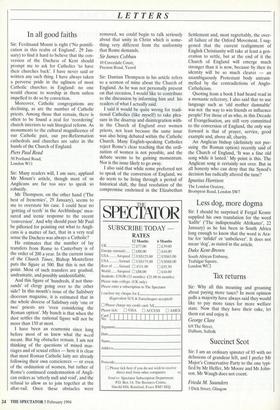Sir: Damian Thompson in his article refers to a sermon
of mine about the Church of England. As he was not personally present on that occasion, I would like to contribute to the discussion by informing him and his readers of what I actually said.
I said it would be quite wrong for tradi- tional Catholics (like myself) to take plea- sure in the disarray and disintegration with- in the Church of England over women priests, not least because the same issue was also being debated within the Catholic Church. Many English-speaking Catholics reject Rome's clear teaching that the ordi- nation of women is not possible, and the debate seems to be gaining momentum. Nor is the issue likely to go away.
I also said that while some preferred not to speak of the conversion of England, we do seem to be living through a period of historical shift, the final resolution of the compromise enshrined in the Elizabethan Settlement and, most regrettably, the over- all failure of the Oxford Movement. I sug- gested that the current realignment of English Christianity will take at least a gen- eration to settle, but at the end of it the Church of England will emerge much stronger than it is now, because by then its identity will be so much clearer — an unambiguously Protestant body untram- melled by the contradictions of Anglo- Catholicism.
Quoting from a book I had heard read in a monastic refectory, I also said that to use language such as 'old mother damnable' was not the way to win friends or influence people! For those of us who, in this Decade of Evangelisation, are still very committed to the conversion of England, the only way forward is that of prayer, service, good example and, above all, charity.
An Anglican bishop (definitely not pur- suing the Roman option) recently said of the Church of England, 'It was a fine old song while it lasted.' My point is this. The Anglican song is certainly not over. But in all honesty who can deny that the Synod's decision has radically altered the tune?
Ignatius Harrison
Brompton Road, London SW7


















































 Previous page
Previous page